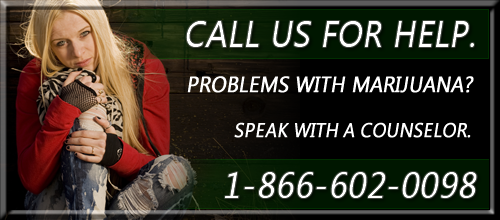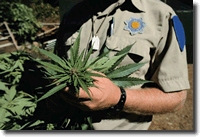About Marijuana
- Types of Marijuana
- Marijuana Effects
- Facts About Marijuana
- Smoking Marijuana
- Dangers of Marijuana
- Marijuana Side Effects
- Marijuana Addiction
- Signs of Marijuana Addiction
- Marijuana Withdrawal
- Marijuana Addiction Treatment
- Marijuana History
- Marijuana Statistics
- Marijuana Laws
- Medical Marijuana
- Teen Marijuana Use
- Signs of Marijuana Use
- Marijuana Legalization
- Cannabis
- Cost of Marijuana
- Marijuana Slang Terms
- Marijuana Pictures

Marijuana Legalization
 Marijuana legalization is on many people minds these days. Negative answers to the question "Would you want your children to smoke marijuana?" are the most convincing arguments of those who oppose marijuana legalization. On the other side, the monetary argument is most convincing, where estimates are made both on potential law-enforcement savings and on potential revenue generated from taxes on growing, producing and consuming marijuana. Proponents argue that because most lawbreakers caught using marijuana get only a "slap on the wrist" anyway, savings and revenue might as well be realized.
Marijuana legalization is on many people minds these days. Negative answers to the question "Would you want your children to smoke marijuana?" are the most convincing arguments of those who oppose marijuana legalization. On the other side, the monetary argument is most convincing, where estimates are made both on potential law-enforcement savings and on potential revenue generated from taxes on growing, producing and consuming marijuana. Proponents argue that because most lawbreakers caught using marijuana get only a "slap on the wrist" anyway, savings and revenue might as well be realized.
Marijuana is classified as a Schedule I drug, meaning it has no known medical uses and possession of any amount is illegal. That puts it in the same category as heroin, whereas cocaine and PCP are Schedule II drugs and may be prescribed by physicians. Smoking a joint is four times more carcinogenic than smoking a cigarette, it remains in the body for weeks at a time, and it is psychologically addicting. The marijuana available today is much more potent than what was smoked in the 1960s and 1970s. Drug use causes serious problems in society: accidents, lost productivity on the job, and wrecked families. Marijuana legalization will make things worse. Following decriminalization of pot in California in the 1970s, use rose five percent. A moderate rise in use is a small price to pay to regain normalcy in the application of our drug laws.
"The 'Gateway' Thesis: Pot smokers are much more likely than non-users to graduate to harder drugs like cocaine and heroin."
Critics cite studies that indicate few users of drugs other than marijuana have done so without first having tried marijuana. They conclude that marijuana leads to the use of more dangerous, harder drugs, such as cocaine and heroin. Proponents argue that not all marijuana users end up using the stronger drugs and not all users of stronger drugs have tried marijuana. The critics counter that marijuana takes away inhibitions to drug use and promotes a culture that allows the use of other drugs.
Nearly all heroin users were initially marijuana smokers. In 1988, a National Institute on Drug Abuse survey found that marijuana smokers are thirty times more likely to use cocaine than those who've never smoked it. Other research confirms a strong correlation between marijuana use and use of cocaine, heroin and the hallucinogens. It should be expected that more people who smoke pot move to harder drugs than those who've never smoked it, for they have already proven themselves curious enough about drugs to try pot.
The anti marijuana legalization side argues that marijuana is addictive and a health hazard, eliciting a pro-legalization argument that counters "only if taken frequently and in large doses." The critics cite studies that link the drug to cancer, respiratory problems, heart attack and damage to the immune system, noting that short-term hazards include memory loss, distorted perception and loss of motor skill. The proponents say marijuana helps increase appetite and relieve symptoms of glaucoma, with the critics countering there are better drugs for these conditions. Proponents for marijuana legalization argue that if marijuana is grown legally, cures for other ills could be found.
Critics argue that marijuana is a hazard not only to users but also to those around them, similar to second-hand tobacco smoke. They also cite statistics that link marijuana usage to crime and driving accidents, saying marijuana affects the ability to concentrate, stay alert, coordinate and react, making it difficult to judge distances, read signs and react to signals. Proponents argue that the same happens with consumption of alcohol and at times with tobacco smoking, both of which are legal.
Proponents say limitations on alcohol consumption and tobacco smoking can be imposed on marijuana use. An age limit can be imposed, and there can be restricted-use locales as well as mandated labels on packaging citing marijuana's potential health dangers. The critics counter that alcohol and tobacco are not as dangerous and do not lead to deadlier drugs later in life, alleging as well that proponents for marijuana legalization aim to get stronger drugs legalized later.
